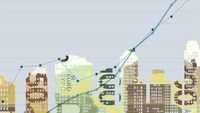The housing market in Malaga continues to show no signs of slowing down. After a 2024 in which sales and mortgages increased again despite the sharp rise in prices, the first data for 2025 show that the trend continues upwards, especially in the provincial capital. In the last rolling year between the first quarter of 2024 and 2025, Malaga is in second place as the provincial capital with the highest increase in price per square metre in Spain: up 16.1%. Only Madrid was above this percentage at 17.9%. The national average price increase over the last 12 months stands at 10.3%. As such, just one square metre in the Malaga property market has now reached a value of 2,757 euros (almost 1,000 euros more than the national average price). This new price tag makes Malaga the fifth most expensive provincial capital in Spain behind San Sebastian (4,455 euros per square metre), Madrid (3,971), Barcelona (3,842) and Palma de Mallorca (3,085 euros).
During the first quarter of this year, the price rise in the city was 2.9%, which is almost double the national average price increase. From a provincial point of view, Malaga is also at the top of the ranking of housing prices in the last rolling year. In fact, it is the province on the Spanish mainland where it has risen the most: 12.3%, reaching 2,709 euros per square metre. Only Santa Cruz de Tenerife (up 12.9%) exceeds the increase recorded for Malaga. In third place is Madrid with an increase of 11.4%. Next are Valencia (+11.3%), Alicante (+11.2%), Murcia (+10.8%) and Las Palmas (+10%) as the other provinces with increases of more than 10% compared to the same period last year.
These upward trends contrast with those of Orense (-3.3%), Badajoz (-2.4%), Cordoba (-2%), Burgos (-1.4%), Ciudad Real (-1.0%) and León (-0.8%) that have all experienced falls in the average sale price of residential property. As a result, Malaga is already the fourth most expensive province for property purchases in Spain, behind only the Balearic Islands (3,140 euros per square metre), Guipúzcoa (3,031 euros/m²) and Madrid (2,835 euros/m²). Vizcaya (2,475 euros/m²) and Barcelona (2,083 euros/m²) are behind Malaga, although they are included among those achieving values above 2,000 euros per square metre.
At the other extreme, 14 Spanish provinces continue to have prices below 1,000 euros per square metre, the cheapest being Ciudad Real (647 euros), Cuenca (763), Jaén (819), Teruel (857) and Badajoz (867 euros/m²). Focusing the analysis on the first quarter of this year, the average price of housing has risen by 3.06% in Malaga province as a whole. The regional director for Andalucía and Extremadura at property valuation company Gesvalt, Gregorio Abril, predicts that this year "Malaga will continue to be one of the major players in the real estate market in Andalucía." He adds: "The figures from the last quarter of our housing report, in which we have recorded the highest price in the region for both property purchases and rentals, consolidate Malaga's position and its attractiveness to both buyers and investors."
For their property consultancy business, these figures show that there are "no signs that this upward trend will reverse in the short term: demand continues to be very high and interest in the region, especially in coastal areas, remains strong." For this reason, Abril believes that everything points to the fact that, in this year, the Malaga property market "will be marked by sustained growth, where access to housing and the lack of supply will continue to be one of the main challenges to be addressed."
The rental market in Malaga does show some signs of moderating after the sharp rises of the last two years that saw double-digit growth in the average price of rented housing. Between the first quarter of 2024 and the first quarter of 2025, the price of renting a residential square metre has risen by 9.8% in the city, compared to 16% and 13.5% in the previous two years. The first quarter of this year has seen an even greater slowdown as the average price has risen by only 2% in those three months.
In the rental ranking of all provincial capitals in Spain, Malaga is the fifth most expensive place to rent a flat, after Barcelona, Madrid, San Sebastian and Palma de Mallorca. It is no longer among the top ten for the highest price increases, although in Andalucía it continues to lead the rest of the pack. At the provincial level, the rise in rents in the last rolling year has been slightly more intense than in Malaga city itself, exceeding 10% (specifically up 10.1%, reaching 15.76 euros per square metre per month). Andalucía as a whole recorded a year-on-year growth of 9.4% and a price of 10.41 euros per square metre per month.
After Malaga come Huelva (up 9.2% and 9.83 euros/m²/month), Seville (+9.1% and 10.60 euros/m²/month), Cadiz (+8.6% and 11.04 euros/m²/month), Granada (+8.3% and 9.39 euros/m²/month), Almeria (+7.6% and 8.78 euros/m²/month), Cordoba (+7% and 7.95 euros/m²/month) and Jaén (+5.7% and 5.42 euros/m²/month).
The Spanish tax authorities are monitoring a growing number of foreigners moving to and living in the Balearic Islands without paying income tax as residents, according to Ana Julia Fernández, the agencia tributaria delegate on the islands. The agency is carrying out inspections to try and prevent this, as well as to crack down on Spanish nationals falsely claiming residency in other countries where they don't live in order to gain tax advantages. Among wealthier Spaniards, this is often done in neighbouring Andorra.
However, though the agency is aware of an increase in foreigners not paying their fair share of tax in the Balearics, the increased inspections do not necessarily imply a wider crackdown, Fernández stated. "The tax agency is not going to catch people out… we encourage voluntary compliance," she said. When the Spanish press pushed for information on the nationality of the increasing number of offenders, Fernández replied that this information cannot be shared publicly: “At the tax agency it is essential to respect the principle of the right to preserve the confidentiality of personal data,” she said. Nor were any figures released.
According to Spanish tax law, the authorities consider anyone to be a tax resident if they live in Spain for 183 days or more a year, their main economic interests are located in Spain, and/or their spouse and children live in Spain. Non-EU citizens can only legally stay in Spain for 90 days out of every 180 days, so it’s unlikely that many Brits or Americans, for example, meet the 183-day rule unless they have other visa or residency arrangements. Some, whether EU nationals or not, may claim to be non-tax resident but try to live in their second home for longer than 183 days. In this case, the tax authorities look for evidence and often turn to energy companies, for example, to cross reference bills and see when the property has been in use.
Fernández emphasised that the inspection department is also in charge of monitoring international transactions that reduce the tax yield in Spain by transferring profits to low-tax jurisdictions. For this year’s income tax declaration campaign, the authorities have focused in particular on tourist rentals in the Balearic Islands and the agency is now notifying landlords of queries with regard to rental income for the year.
In a bizarre twist, Mallorca’s spiralling housing crisis has seen a gang of Algerian squatters move into an abandoned lobster hatchery perched above the sea in Palma. The once-thriving Pescados Miró seafood plant in El Peñón, Coll d’en Rabassa, now stands in ruin – but for the past few months, it’s served as a makeshift home for four young men. Locals say the group has hooked into electricity illegally, fends for food by fishing, and washes using sea water and a nearby fountain.
The building, at risk of collapse, sits right on the coastline — just metres from tourist beaches and family homes. As the summer season approaches, residents say the occupation has sparked fears of increased thefts, anti-social behaviour and rising insecurity in the area. “We’ve had bikes, bags, even phones stolen,” one neighbour told The Sun. “And now there are strangers watching our homes and tourists.” Despite repeated calls to the authorities, police say they cannot act — as the property is publicly owned and no official complaint has been filed.
Frustrated locals are hitting out at Mallorca’s broken housing system, where rental prices have soared and young islanders are priced out — while abandoned buildings become shelters of last resort. “Locals can’t afford to live here anymore,” one resident said. “But squatters get to stay on the beach for free.”





